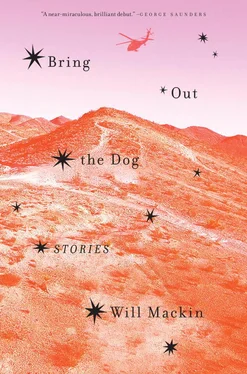Will Mackin - Bring Out the Dog
Здесь есть возможность читать онлайн «Will Mackin - Bring Out the Dog» весь текст электронной книги совершенно бесплатно (целиком полную версию без сокращений). В некоторых случаях можно слушать аудио, скачать через торрент в формате fb2 и присутствует краткое содержание. Город: New York, Год выпуска: 2018, ISBN: 2018, Издательство: Random House Publishing Group, Жанр: prose_military, на английском языке. Описание произведения, (предисловие) а так же отзывы посетителей доступны на портале библиотеки ЛибКат.
- Название:Bring Out the Dog
- Автор:
- Издательство:Random House Publishing Group
- Жанр:
- Год:2018
- Город:New York
- ISBN:978-0-812-99564-0
- Рейтинг книги:5 / 5. Голосов: 1
-
Избранное:Добавить в избранное
- Отзывы:
-
Ваша оценка:
- 100
- 1
- 2
- 3
- 4
- 5
Bring Out the Dog: краткое содержание, описание и аннотация
Предлагаем к чтению аннотацию, описание, краткое содержание или предисловие (зависит от того, что написал сам автор книги «Bring Out the Dog»). Если вы не нашли необходимую информацию о книге — напишите в комментариях, мы постараемся отыскать её.
Bring Out the Dog — читать онлайн бесплатно полную книгу (весь текст) целиком
Ниже представлен текст книги, разбитый по страницам. Система сохранения места последней прочитанной страницы, позволяет с удобством читать онлайн бесплатно книгу «Bring Out the Dog», без необходимости каждый раз заново искать на чём Вы остановились. Поставьте закладку, и сможете в любой момент перейти на страницу, на которой закончили чтение.
Интервал:
Закладка:
At three hundred meters we shed our packs and drank the last of the water in our canteens. We folded our letters from home along with pictures of our wives, sons, and daughters, and tucked them under rocks so they wouldn’t blow away. From there, we started to leapfrog. Hank and Q leapt with me and Hal. They’d cover us as we advanced, then Hal and I would cover them. We ran into the wind. The sun shone down. Goon, Mooch, Lyle, and the rest leapfrogged on either side of us. To be up and running felt like wearing a suit of bells. Crouching behind a rock, I turned to watch Hank and Q charge past. Hank’s good eye was wide open, while Q appeared to be holding his breath. Seconds later, Hal and I sprinted past them, jingling. Thus we closed on the dragon’s teeth, until we came to a smooth field of slate.
I could see, across the slate, Taliban peeking through gaps in the teeth. The wind delivered their telltale mix of BO and cigarette smoke. We looked to Hal for the signal—after which we’d run across the slate, firing bursts and lobbing frag—but Hal was staring off into the distance again, at that thing that only he could see. Whatever it was seemed to be telling him to hold steady and let the clouds roll by, then, maybe, broker some sort of truce. Shouting into the wind, we could agree to lay down our arms and meet in the middle. The Taliban could share with us whatever sustained them—smoked knees, fermented milk—and we could cook them an MRE lasagna. Then came the sound of boots on slate. I turned to find Hank, running. Then Q. Then we were all up, howling under the blue sky, running toward the dragon’s teeth and whatever lay beyond.
Crossing the River No Name
One rainy night, in March 2011, we crossed a muddy field to intercept a group of Taliban who’d come out of the mountains of Pakistan. They were walking west. We were patrolling north to arrive at a point ahead of them, where we’d set up an ambush. The field was actually many fields inundated by snowmelt and rain. Piles of rocks, laid by farmers, demarcated the flooded borders. Every so often we’d pass evidence of what had grown in those fields: an island of blighted cornstalks, a soybean shoot—as perfect as a laboratory specimen—floating in a shin-deep lake. Someday, I figured, the sun would come out, the land would dry, and the farmers would be back to restake their claims. That night, however, they’d taken shelter on higher ground, and that entire miserable stretch of Khost was ours.
Electric streaks of rain fell straight down on my night vision. Cold rose from the mud into my bones. It squeezed the warmth out of my heart. My heart became a more sensitive instrument as a result, and I could feel the Taliban out there, lost in the darkness. I could feel them in the distance, losing hope. This was the type of mission that earlier in the war would’ve been fun: us knowing and seeing, them dumb and blind. Hal, walking point, would’ve turned around and smiled, like, Do you believe we’re getting paid for this? And I would’ve shaken my head, like, No. But now Hal hardly turned around. And when he did, it was only to make sure that we were all still behind him, putting one foot in front of the other, bleeding heat, our emerald hearts growing dim.
We made steady progress through the rain until we came to a river. The river looked like a wide section of field that had somehow broken free, that had, for unknown reasons, been set in motion. In fact, the only way to tell river from field was to stare at the river and sense its lugubrious vector. But to stare at the river for too long was to feel as if it were standing still and the field were moving.
Hal called on our best swimmers, Lex and Cooker, to cross first. They removed their helmets and armor. They kept their rifles and pistols. Cooker tied a loop to the end of a hundred feet of rope and clipped the loop to the hard point on Lex’s belt. He hooked himself onto the rope behind Lex, and they set off.
Lex and Cooker waded into the icy water. Long waves purled off their knees. Dark voids streamed from their waists. A third of the way across, they lay in the water and side-stroked. Their heads popped up and down on the surface. Their exhalations wove together in thick paisley clouds. The rope sank and oscillated in the current. Hugs tied on another hundred feet. Lex and Cooker crawled onto the opposite bank—forty yards across, and another twenty downriver—steaming from exertion and cold.
“Pair up,” Hal said.
With the rope now anchored at either end, the rest of us would cross wearing all our gear. The first pair—Hugs and Polly—carried the helmets and armor Lex and Cooker had left behind. They clipped themselves to the rope and walked out. Hand over hand, they pulled themselves across the river, then heaved themselves onto the far shore, where they unclipped and joined the anchor. Hal and I were next. Hal hooked himself to the rope ahead of me and marched out into the river.
AS FAR AS I knew, the only thing in the world that scared Hal was water. Which was why he’d joined the navy and become a SEAL—to conquer that fear. And, for the most part, he’d been successful. Ninety-nine times out of a hundred, he was able to overcome his trepidation by sheer force of will. But there remained that one percent, wherein the invincible core of Hal’s fear would reassert itself.
The last time I’d seen this happen was September of 2005, on the Atlantic Ocean, in the middle of the night. We’d tracked down a freighter fifteen miles off the coast of Virginia, steaming east. Crouched in our high-speed assault craft, or HSAC, we’d closed in on the massive freighter’s starboard quarter, just aft of the island, for a mock raid. It was a training mission; the hijackers on board the freighter were actors, and the rounds in our assault rifles were paint. But everything else was real: the crescent moon, the twenty-foot waves, the darkness between the waves, and the way the moonlight played in their quivering peaks.
The freighter’s gigantic engines were throbbing, their heat shining through the thick steel hull. Waves that flattened along the skin of the ship were re-forming perfectly in its wake, as if the freighter weren’t there. Meanwhile, Lex, at the HSAC’s helm, was bringing us in on a shallow angle, weaving through crests and troughs. Cooker, standing at the bow with the caving ladder hooked to a pole, was raising that pole toward the freighter’s bulwarks. At twenty feet and closing, I could hear the hiss of the waves slipping down the freighter’s skin. At ten feet, I could hear the sucking sound of wave troughs disappearing under the ship. That was when Hal yelled, “Stop!”
Lex cut the throttles to idle; Cooker retracted the pole. We all lay down in the HSAC, anticipating Hal’s call for an emergency breakaway, followed by a banked turn and a high-powered retreat over the waves. Instead, Hal remained silent, allowing us to drift away from the freighter. When I looked up at Hal standing in the HSAC in the moonlight, I saw that his usual infectious calm had been replaced by something more spooky and insular. It was as if he’d realized that our fight against the hijackers of the world would never end, so why continue? Five seconds later, though, he came to his senses. He ordered Lex to chase down the freighter. He directed Cooker to hook the caving ladder onto the bulwarks. And we followed him up the side of the ship, ascending through waves that enveloped us in their cool velocity and threatened to sweep us out to sea.
Later, when I asked Hal what had caused him to yell “Stop!” that night, he said that something hadn’t felt right. His answer had seemed credible enough, because nothing ever felt right.
Читать дальшеИнтервал:
Закладка:
Похожие книги на «Bring Out the Dog»
Представляем Вашему вниманию похожие книги на «Bring Out the Dog» списком для выбора. Мы отобрали схожую по названию и смыслу литературу в надежде предоставить читателям больше вариантов отыскать новые, интересные, ещё непрочитанные произведения.
Обсуждение, отзывы о книге «Bring Out the Dog» и просто собственные мнения читателей. Оставьте ваши комментарии, напишите, что Вы думаете о произведении, его смысле или главных героях. Укажите что конкретно понравилось, а что нет, и почему Вы так считаете.












